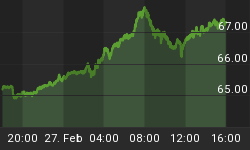Minutes ago, eurozone finance ministers announced that they've agreed to give Greece four months of breathing room in which to get its financial house in order. In that time, Greece will either work out a debt restructuring with its creditors or create a fully-functioning economy capable of managing the developed world's second highest ratio of government debt-to-GDP.
And they'll do these things while increasing the number of public sector jobs and limiting the privatization of public assets. More bureaucrats, richer pensions, stricter labor laws... this is straight out of French president Francois Hollande's playbook, which in turn was cribbed from a long line of European social democrats. All of whom, it shouldn't be necessary to point out, failed miserably for a pretty basic reason: after government reaches a certain size, making it bigger is a net negative. That is, it costs more than it produces so the country gets poorer. A shrinking pie doesn't allow major constituencies to keep what they have, everyone starts squabbling, the place becomes ungovernable and the architects of the plan get shown the door.
Giving the Greek left four months in which to formulate a new economic policy -- without a currency that it can devalue -- is just giving the global financial markets a vacation from this particular worry. Vacations by definition have to end, so come June Greece and the rest of the eurozone will be right back where they were yesterday, though with even more debt.
So the questions become:
How can a government hire more people and tighten regulations while simultaneously paying off debt? The answer is that it can't. The two are mutually exclusive in the short run, and four months is the shortest of short runs in the realm of fiscal policy.
Why would a Greek citizen keep euros in a Greek bank, knowing that 1) the crisis will return in a mere four months and 2) the main tool for fixing the country's finances is aggressively stepped-up tax collection, which means they're coming for your money one way or another? The answer is that they wouldn't. A few months of breathing room just gives savers a chance to get out in a leisurely rather than panicked way.
There simply isn't a political fix for this much debt. And though delaying the day of reckoning has worked beautifully for stock market investors and incumbent politicians it has also allowed the developed world to dig itself an even deeper financial hole.
So Greece and the rest of the eurozone now get another four months to borrow, spend and hope for the best, while "the best" recedes further towards the horizon until all that's left is a menu of really painful options. It's not a surprise that putting them off is easier than facing them head-on.















